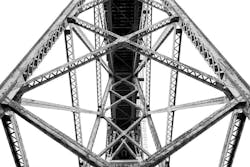America's structural steel industry remains a success story
By AISC
Domestic steel mills produced more than 6 million tons of structural steel last year, according to the American Iron and Steel Institute.
That structural steel supply chain has remained robust, active, and ready to build tomorrow’s landmark structures throughout the last few months.
Confusion and uncertainty regarding the availability of structural steel boil down to the generic nature of the word “steel.” When people hear that mills supplying the automotive industry are shutting down, they assume that also applies to structural steel mills.
But automotive steel and structural steel have different supply chains. Structural steel mills have been designated essential businesses in many states across the country.
“We are unaware of any current shortages in steel supply, and all of Nucor’s steel mills have continued to operate during the COVID-19 pandemic,” said Katherine Miller, director of public affairs and corporate communications with AISC member producer Nucor Corporation. “We have continued to produce steel for critical projects and to meet our customers’ needs for our products without interruption.”
The hollow structural section (HSS) sector has also carried on without interruption.
“From the beginning of the pandemic, Atlas was deemed an essential business since the steel industry was deemed critical infrastructure,” explained Brad Fletcher, a senior sales engineer with Atlas Tube, an AISC member HSS producer. “As such, all of our mills have been up and running as normal to meet our customers’ needs. We’ve cut back hours here and there based on demand, but we’ve had no layoffs—and we aren’t planning any.”
Because operations remain largely normal, lead times remain short.
“Lead times have not fluctuated due to the pandemic, and we’ve had no supply interruptions,”
Fletcher said. “We have a strong relationship with our coil producers, and there have been zero issues with our coil supply.”
Around 70% of structural steel comes from service centers instead of directly from steel mills and HSS producers. That makes service centers a particularly good barometer for steel availability, and all indications remain strong.
“There are no steel shortages—absolutely, positively not,” said Gary Stein, CEO of Triple-S Steel, an AISC member service center company with a network of approximately 30 locations. “I’ve seen headlines talking about steel mill shutdowns, but that’s not structural steel. Structural mills are all running just fine. Most structural steel flows through distribution centers like ours, and I and my competitors all have plenty of inventory.”
Safety is also top-of-mind for these companies as they continue to meet demand for structural steel.
Staying operational also means staying safe, noted Miller. “The health and safety of our teammates is our number one cultural value at Nucor, and we have implemented a number of safety measures as we operate during this pandemic,” she said. “These include social distancing, face coverings, staggered schedules, enhanced cleaning procedures for work areas, and using remote work wherever possible.”
“Our primary concerns at this time remain the health and safety of our employees as well as maintaining our quality product and service commitments to our customers,” echoed Ivonne Furneaux, director of communications and community relations with AISC member producer SSAB. “Production continues, our supply chain is intact, and we do not anticipate disruption to our service levels. However, we will continue to monitor the situation and will take appropriate measures as warranted.”
“Our plants are running routinely, though with precautionary measures, and sales and office staff have been working remotely,” said Stein. “But we’re still getting our work done. There’s plenty of steel in the supply chain every day, pandemic or not.”
